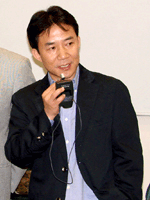Research Staff of the school, a presentation of Dr. Q.S. Tong
Staff profile : Dr. Q.S. Tong

Q. S. Tong joined the University of Hong Kong in 1992. He has been a research fellow at Harvard University and is an adjunct professor of English at Nanjing University, China. His research interests include romanticism, critical theory, and cross-cultural and comparative studies. His current research focuses on the formation of the English idea of China in the eighteenth and nineteenth centuries. He is the author of Reconstructing Romanticism (1997) and numerous articles, in both English and Chinese, on literature, language, culture and society. He has been invited to edit special issues for scholarly journals and is an editorial member of several international journals. He is a founding co-editor of Critical Zone: A
Forum of Chinese and Western Knowledge, jointly published by the University of Hong Kong Press and Nanjing University Press.
He has been interviewed by one of his postgraduate students.
Dr. Tong, I know that you have done quite a lot of research in the field of cross-cultural studies. Could you briefly introduce your research interests, and maybe name a few of your current projects?
My research is focused on historical interactions between China and the West. My current projects include a study of the English critic and poet William Empson who worked and lived in China in the 1930s and 1950s and a historical analysis of the circulation of the Chinese play The Orphan of Zhao in Europe.
What inspired you most to work on your current research project?
Hong Kong’s colonial history and its present role in China’s relations with the world.
I know that you are supervising several postgraduate students, what are the topics that your students are working on? And what are your expectations for the kind of topics that you would like to supervise in the future?
Most of my research students work on topics in cross-cultural studies, for example, Oscar Wilde’s use of Chinese aesthetics and philosophy, Western missionaries’ contribution to the Chinese language reform movement, China’s use of the West in its development of modern legal and educational systems, and the Cambridge philosopher G. L. Dickinson’s study of Chinese civilization.
I would be interested to supervise students who discuss topics in world literature, cross-cultural studies, and cultural theory of literature.
As we know you have edited several books in collaboration with authors and publishers in Mainland China, could you tell us something about these publications?
I’ve participated in a number of China’s national research projects including “Twentieth Century History of Literature” which won the first Chinese Government Book Prize in 2008. In collaboration with Nanjing University, we edited and published 3 volumes of Critical Zone: A Forum of Chinese and Western Knowledge; the series was meant to promote a better understanding of critical and literary knowledge from China and the West.
I’ve heard that you have a large collection of books. What books are you reading recently and could you name a few interesting ones?
I’ve just begun reading Peter Purdue’s China Marches West: The Qing Conquest of Central Eurasia. The book is a gripping narrative of the expansion of the Qing Empire (1644 -1912) into Central Asia. I always wanted to know more about this part of the history of China. Others books I’ve read recently include Orhan Pamuk’s Istanbul, which interweaves the life of the city and the life of the author, and Maria Rosa Menocal’s Ornament of the World, a historical study of the multicultural vitality of medieval Spain.
Thanks a lot for the interview, Dr. Tong. Wish you all the best in your future academic endeavors.

Our apologies, you must be logged in to post a comment.